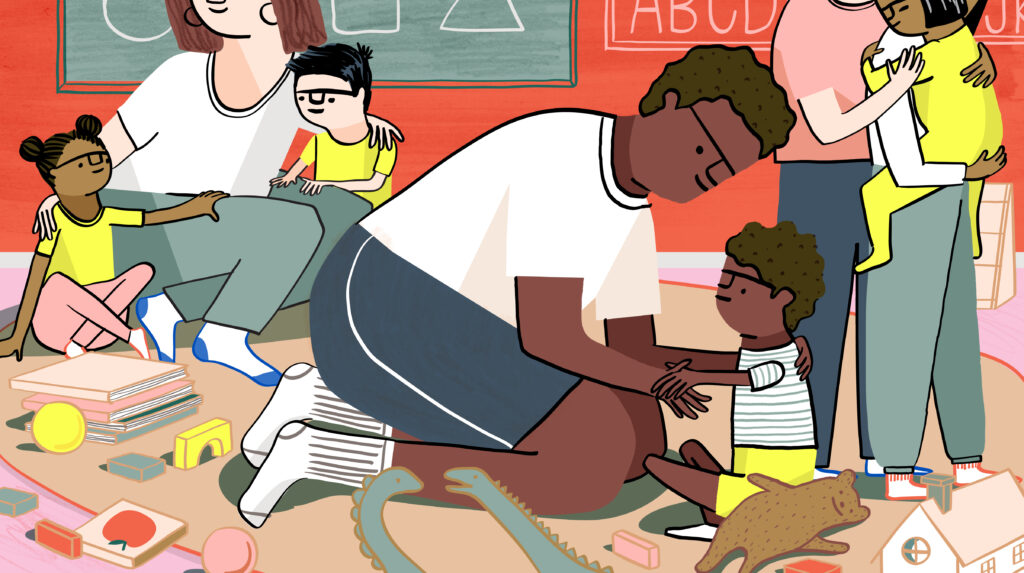Anxiety is your body’s natural response to stress. It’s a feeling of fear or apprehension about what’s to come. The first day of school, going to a job interview, or giving a speech may cause most people to be anxious and nervous.
Anxiety is one of the most common mental health concerns for children, just like adults, children feel worried and anxious at times.
But if your child’s anxiety is starting to affect their well being, they may need some help.
What Makes Children Anxious?
Children can feel anxious about different things at different ages. Many of these worries are a normal part of growing up.
From the age of around 6 months to 3 years it’s very common for young children to have separation anxiety. They may become clingy and cry when separated from their parents. This is a normal stage in a child’s development and should stop at around age 2 to 3.
It’s also common for preschool-age children to develop specific fears or phobias. Common fears in early childhood include animals, insects, storms, heights, water, blood, and the dark. These fears usually go away gradually on their own.
There may also be other times in a child’s life when they feel anxious. For example, many children feel anxious when going to a new school or before tests and exams. Some children feel shy in social situations and may need support with this.
When Is Anxiety A Problem For Children?
Anxiety becomes a problem for children when it starts to get in the way of their everyday life.
If you go into any school at exam time, all the children will be anxious, but some may be so anxious that they don’t manage to get to school that morning.
Severe anxiety like this can harm children’s mental and emotional well being, affecting their self-esteem and confidence. They may become withdrawn and go to great lengths to avoid things or situations that make them feel anxious.
What Are The Signs Of Anxiety In Children?
When young children feel anxious, they cannot always understand or express what they are feeling. You may notice that they:
- Become irritable, tearful or clingy
- Have difficulty sleeping
- Wake in the night
- Start wetting the bed
- Have bad dreams
In older children you may notice that they:
- Lack confidence to try new things or seem unable to face simple, everyday challenges
- Find it hard to concentrate
- Have problems with sleeping or eating
- Have angry outbursts
- Have a lot of negative thoughts, or keep thinking that bad things are going to happen
- Start avoiding everyday activities, such as seeing friends, going out in public or going to school
- Find out more about the symptoms of anxiety on our page about anxiety disorders in children.
Why is my child anxious?
Some children are more likely to have worries and anxiety than others; children often find change difficult and may become anxious following a house move or when starting a new school.
Children who have had a distressing or traumatic experience, such as a car accident or house fire, may suffer from anxiety afterwards.
Family arguments and conflict can also make children feel insecure and anxious.
Teenagers are more likely to suffer with social anxiety than other age groups, avoiding social gatherings or making excuses to get out of them.
How to help an anxious child
If a child is experiencing anxiety, there are things that parents can do to help.
- First and foremost, it’s important to talk to your child about their anxiety or worries. Reassure them and show them you understand how they feel.
- If your child is old enough, it may help to explain what anxiety is and the physical effects it has on our bodies. It may be helpful to describe anxiety as being like a wave that builds up and then ebbs away again.
- As well as talking to your child about their worries and anxiety, it’s important to help them find solutions, For example, if your child is worried about going to a sleepover, it is natural to want to tell them not to go. However, this could mean your child feels that their anxiety will stop them from doing things.
- It’s better to recognise their anxiety and suggest solutions to help them, so they can go to the sleepover with a plan in place.
Other Ways to Ease Anxiety in Children:
- Teach your child to recognise signs of anxiety in themselves
- Encourage your child to manage their anxiety and ask for help when they need it
- Children of all ages find routines reassuring, so try to stick to regular daily routines where possible
- If your child is anxious because of distressing events, such as a bereavement or separation, look for books or films that will help them to understand their feelings
- If you know a change, such as a house move, is coming up, prepare your child by talking to them about what is going to happen and why
- Try not to become overprotective or anxious yourself
- Practice simple relaxation techniques with your child, such as taking 3 deep, slow breaths, breathing in for a count of 3 and out for 3.
